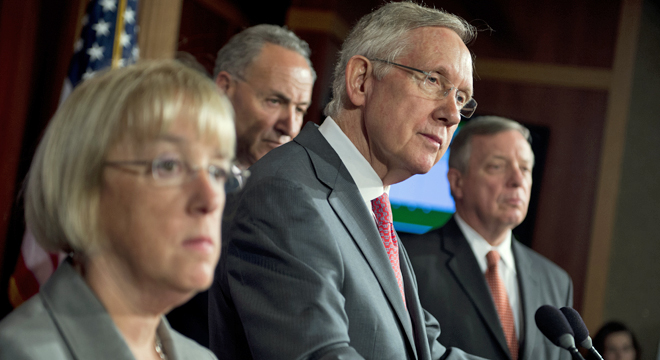Bipartisan negotiations to reach a filibuster reform consensus continued Tuesday, with some senators striking a more hopeful tone over the prospects for an agreement. But details on what such a plan would look like were nowhere to be found. TPM spoke with many senators and none were willing to discuss the substance of the talks.
“We’ve had some very productive conversations,” said Sen. Jon Kyl (R-AZ), the No. 2 Republican, who is retiring.
“We need to avoid breaking the rules to change the rules — that’s a pretty universal position among both Democrats and Republicans,” Kyl told TPM. “There are some ways that the body needs to change its way of doing business in order to be more productive. There are conversations going on about all of that. And I think they have the potential to provide some bipartisan solutions.”
Senate Majority Whip Dick Durbin (D-IL) also sounded hopeful — but had no details.
“We’re still talking about it. We don’t have an agreement yet,” Durbin told TPM. “There are some ideas out there and they’re held pretty strongly but no final package. We’d love to have an agreement with the Republicans to make this a more efficient and fair institution.”
Typically when senators are keeping internal negotiations private, it suggests genuine progress toward agreement. But these discussions are proceeding under unusual circumstances. Republicans want to prevent Democrats from taking unilateral action — and from creating a precedent that a single party can change the Senate rules with a bare majority. Democrats want to limit the minority’s obstructive power, but would prefer to forge an acceptable compromise with Republicans, rather than proceeding unilaterally, with future consequences for minority rights in the Senate unknown.
Underlying all of it — nobody knows if Majority Leader Harry Reid (D-NV) genuinely has his caucus aligned to change the rules by himself. And so negotiations continue with an unclear sense of whether Democrats have any leverage.
“I think we’re having hopeful discussions,” Sen. John McCain told TPM. “We’re doing everything we can, but I don’t know if we’ll succeed. … I can’t tell you the back and forth but we are having discussions.”
Asked if negotiators have made any progress, Sen. Lindsey Graham (R-SC) quipped, “I’m sure they have — I just don’t know about it.” And is he aware of any concessions Democrats have been willing to make to avoid using the Constitutional option? “No.”
Asked how he sees the prospects for a deal, Sen. Chuck Schumer told TPM: “People are talking to one another.”
Numerous Republicans took to the floor to speak out against the Democrats’ position — including Sens. Mike Johanns (NE) and Orrin Hatch (UT). Sen. Roy Blunt (MO), a GOP leadership member, unveiled a new website dedicated to attacking Democrats for their efforts.
Sen. Jeff Sessions (R-AL) said he opposes weakening the filibuster, justifying his party’s record-high use of the tool by accusing Reid of persistently limiting room for amendments and debate on major issues.
“It’d be a real tragedy,” said freshman Sen. Ron Johnson (R-WI) said. “If we change the rules with 51 votes that’s a Rubicon I think we will really regret having crossed. And I’m really urging Senator Harry Reid and my Democratic colleagues: do not cross that Rubicon. They’ll go down in history as destroying the United States Senate.”
On the floor, Sen. Barbara Boxer (D-CA) carried the Democrats’ message that the filibuster had been abused and that senators who want to obstruct legislation or nominees should stand in front of the cameras and make their thoughts known.
It’s a sentiment shared by many of her colleagues.
“We need to figure out some way to make the institution work better, and the filibuster has been abused,” Sen. Bob Casey (D-PA) told TPM. “I wouldn’t take any option off the table to make the place run more efficiently. And you can still preserve minority rights by doing that.”
“We’ve never seen anything like this obstruction by a party leader, Mitch McConnell,” Sen. Sherrod Brown (D-OH). “Maybe we can come to an agreement, I’m fine with that. … But people need to take the floor if they want to delay.”
Is there hope for a deal? “I don’t know,” he said. “We need to go ahead on it if they don’t.”
Retiring Sen. Ben Nelson (NE), arguably the most conservative Democrat, said he’s all in favor of a talking filibuster.
“Yeah, Mr. Smith Goes To Washington, that’s all we have to do,” he said. “If somebody thinks it’s important enough to delay the work of the Senate, then they ought to think it’s important enough for them to be on the floor of the Senate to explain why.”










